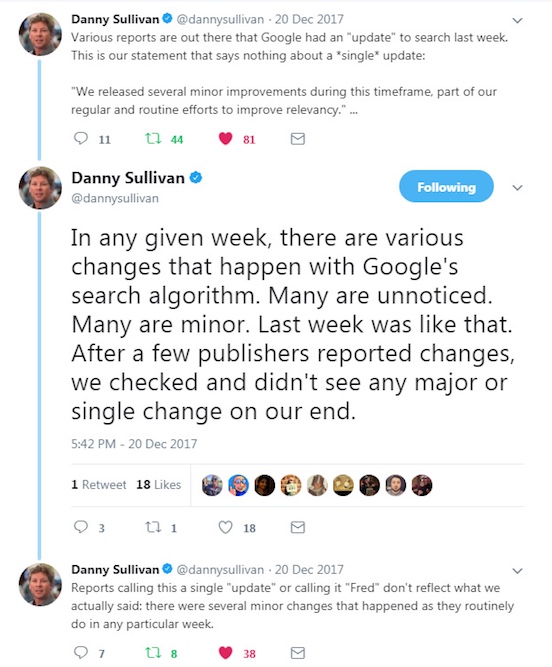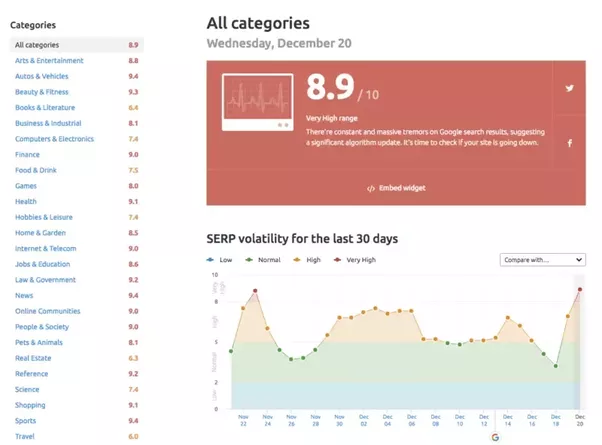How to Recover Your Business from Google Maccabees Penalty

In every few months, Google releases an update targeted at websites that are not providing value to the users, or are manipulating the search results with spamming techniques. For obvious reasons, Google remains quiet about the changes that they make to the algorithm. The Google Maccabees penalty, or the Fred update as it is better known as, was rolled out in the first week of March and was one such update that made the SEO firms and websites sit up and take note.

(Source)
For SEO services, they started noticing a slump in the web traffic and some websites mentioned a loss of 20-30 percent of traffic. The marketers, who were busy with the search results, are now spending time in the identification of issues and building of plans to recover from the said update.
What Was The Google Maccabees Update?
The Google Maccabees update is a new update that works almost like the previous algorithm updates, but puts more of its focus on improving user experience. Updates to the core algorithm of Google do not have a formal name and they are all informally named Fred. Barry Schwartz of SERoundtable called it Maccabees in honor of Hanukkah and then the rest of world followed cue.

(Source)
A couple of years ago, SEO technicians and marketers started realizing the value of long-tailed keywords and answering questions of the customers. As soon as the new tactics was found, the professionals also got a way of taking advantage and manipulating the tactics. Many of the companies have since then started creating low quality webpages for long-tailed keywords, called ‘keyword permutations.’ This strategy of the professionals ultimately ends up affecting the user experience and that is something Google has always taken a stand against.
The main aim of the update is to support and promote websites that have good quality and readability, and also to punish the websites that do not meet the standards of high quality user experience.
The Symptoms of the Maccabees Effect
The previous Fred update from Google penalized sites that provide thin and unclear content that did not have any purpose. The new update also has this feature and it targets black hat strategies related to aggressive monetization on the sites. Google wants to prevent the businesses from overloading the sites with adverts and offering low-value content with few or no user benefits. The websites that Google targeted had one or more of the following features:
- An annoyingly large presence of ads
- Unnecessarily long content on all topics made for getting high ranks
- Content has affiliate links or ads spread all over, and the quality of content is way below the industry-specific mark
- Deceptive advertisements that look like a play or download button to get people to click
- Aggressive monetization
- Thin content
- UX barriers
- Mobile site loading problems
- Aggressive affiliate setups
The Kind of Websites Affected Under the Update
If you are affected by the Maccabees update, you will see a sizeable drop in the organic search traffic, especially from Google. To solve the penalty, you need to take action and fix all the webpages as soon as you can, or you can rethink the ad display on the site. The following are some of the additional patterns and warning signs that you need to stay aware of:
- The Maccabees update affected different kinds of websites. The sites that were affected the most include ecommerce, blogs, affiliate sites, travel, and more.
- The update specifically targeted websites that have excessive keyword permutations, affiliate links, and high number of ads. These are the sites that noticed the biggest hit in their traffic.
Here’s a look at each of the issues separately:

(Source)
Keyword Permutations
Keyword permutations mean using the long-tail keywords or multiple phrases that basically refer to the same thing. For instance, keywords like how to apply makeup fast, how to apply makeup, how to use makeup, and how to apply fast makeup all essentially mean the same thing. The marketing managers and SEOs have started making multiple pages for almost similar keyword permutations.
Thin Content
If the websites rankings are highly dependent on the exact match long-tailed keywords or has a high volume of outdated and invaluable content, your website will see a drop in rankings and thereby, in traffic.
Low-quality of Backlinks
It has already been nearly a decade that Google has warned and started taking actions for the sites that buy or build low-quality backlinks. If you have paid for generic backlinks, like comment spam, blog networks, .edu profile, or used certain websites for building links for SEO, then Maccabees has most likely penalized your website.

(Source)
The Steps to Recover From the Traffic Slump
The Google Maccabees update might have affected your traffic flow but that is not the end of the world. You can still gain your position back in three steps.
- Diagnose the Drop in Traffic
The first step of the traffic recovery plan is to ensure that you were really affected by the update and there is no other reason that caused your site to lose out.
- Did you notice a drop in traffic or the number of keywords that you site ranks for? Start with a keyword gap analysis and compare each URL ranking for the number of keywords before the update and the present numbers. A page that lost a sizeable number of keywords was certainly held as providing low value to the viewers. If a lot of these pages are found, then you have been affected.
- Does your site have more of low-quality generic contents than the high quality stuff that the users can love and share?
- Is there a high number of affiliated links or ads in your content?
- Is there an overuse of call to action overlays?
- Is the content made to gain revenues rather than offering value for solving what the user was looking for?
If the answer to all these questions is a ‘yes’, then you probably have been impacted through the recent Maccabees update.
- Fix the Website
Recovery is a lengthy procedure and though it is not too difficult, it is very time consuming and quite expensive. There are two things you need to address for the Google Fred update.
- a) Improve the Content Quality
This is not the first update that Google has come up with for ensuring high quality content and it is not going to be the last. The best way of avoiding any drop in traffic from future updates or a recovery from the Maccabees update is to make sure that you are focusing on in-depth, high quality, and authoritative contents on the website.
Ask yourself the following questions to know if you are creating a high-value content for your website.
- Does the expert writing the articles know the topic well? You are on the right track if they do.
- Does the article have factual, stylistic, or factual errors? If the content has errors, you need to make sure that it is edited thoroughly.
- Is the article original in its information, content, research, reporting or analysis? If it is completely original in all regards, then you have successfully created original value for Google to reward.
- Are the contents giving comprehensive or complete depiction of the topic, or is the content too short, lacking in useful specifics, or otherwise unsubstantial? If your website only has short articles of 500 words, then it is probably one of the reasons why the update has affected you.
- b) Audit the Backlinks
Firstly, make sure that the link profile of your website looks natural. Link data points like follow to no-follow ratios, types of link, anchor text, link location, and so on are all of the factors that Google takes into account when it determines the value of a backlink profile, and the value of an inbound link towards the website’s SEO authority.
You can use a backlink checker like SEMrush tool or check out the links in the Google Search Console to figure out the bad links. Then, you can make a disavow file to help Google know that it needs to avoid these from the calculation.
- Ensure that None of Google Guidelines are being Violated
Google has mentioned that the Maccabees update was targeted at websites that were not going by the Webmaster guidelines. You need to review the guidelines to make sure you are not engaging in any black hat or outdated SEO techniques like:
- Participation in link schemes
- Automatic generation of content
- Creation of pages with no or little original content
- Doorway pages and cloaking
- Participation in affiliate programs that add no significant value
- Scraped contents
- Uploading pages without relevant keywords
The Maccabees is just one of the many updates that Google has rolled out to penalize the sites using unfair means. You can only expect the guidelines and updates to get stricter by the day. Thus, instead of waiting for another update and then, taking the precautions, you better start preparing ahead of time.

